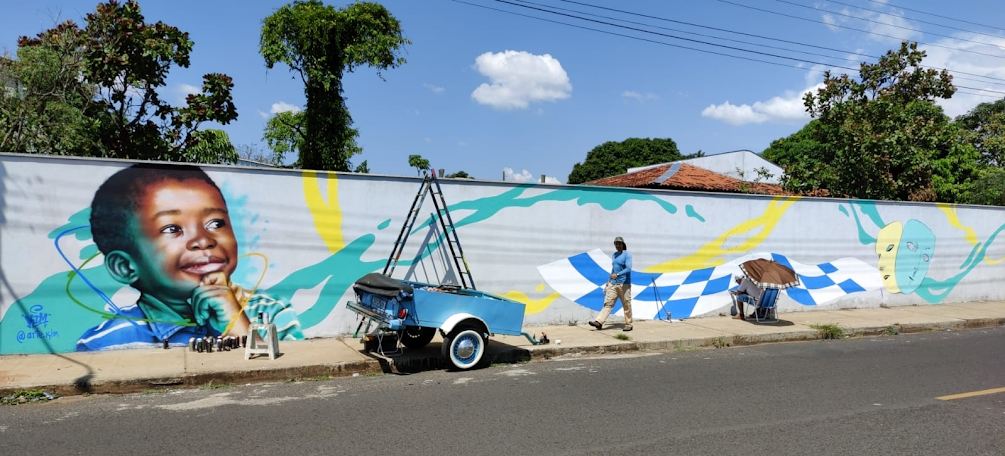 |
| The outer wall of the community center is getting a fresh coat of paint and a new mural. |
The first time I visited the Estação Vida community center, it was to help set up a computer lab. A local bank had upgraded its computers and offloaded the old ones on the center as a donation. They were pretty dated, but with the right, light-weight Linux distro they were good to go. It took a few visits to get the computer lab in shape, and on the last one I got to watch a volunteer work teach the kids some computing basics. What really got me hooked was seeing the space and everything the center offers the community in general, and the children in particular.
It started very small nearly two decades ago. A group of women met regularly at a local church to learn how to do sewing and crafting to produce items for sale. As time went on, childcare became more of an issue, as these women usually had children that they'd either bring with them or leave home alone. Someone started taking them to an open, grassy area for games to keep them busy, and soon enough that became it's own program. Eventually the city donated land, and people and organizations came together to build the basic structure.
Now home to classrooms, a kitchen and cafeteria, plenty of trees and open space, and a large garden that supplements the meals prepared on site, Projetos Sociais Estação Vida is a vibrant place. Since I was there last several years ago they got an upgraded computer lab, a new space for martial arts training, and have gone essentially off the electrical grid with solar panels. Seeking to be sustainable in even the smallest details, rainwater and the runoff from water fountains is saved and used for cleaning as well as irrigating the garden.
There are over 200 children enrolled in weekday programs for the period they are not in school, and they have a nutritious meal prepared in the kitchen every day. This is especially important because the public schools in Brazil usually don't offer much in terms of a lunch, when they offer it at all. With homework help, crafting, martial arts, sports, and other offerings, the community center enriches the lives of the children enrolled.
Some of the programs offered are open to children not enrolled full time, with spaces available to them in things like dance and martial arts. There are occasional community events there as well. Honestly, I'm not doing justice to all it provides.
A truly grassroots effort brought this great community center and its programs into being, and ever since I moved back to the United States in 2015 I've wanted to do something to support that ingenuity. I could promote it here, but then it would be nearly impossible for people to contribute financially, and even if they could, it would not be tax exempt in the US, despite being a non-profit organization in Brazil. The solution I hit upon was Uberlandia Development Initiatives.
Uberlandia Development Initiatives (let's call it UDI Brazil) is a small, US-based non-profit that aims to spread the word about our partner NGO, Projetos Sociais Estação Vida, and raise funds to help extend what they can do. Everyone involved in UDI Brazil is a volunteer, drawing no salary, and aside from transaction fees, all the money raised goes to the community center. Unlike other organizations supporting international NGOs, the only strings attached to our funding is that the community center provide a full accounting for how it is used. They have already demonstrated that they know what to do and how to do it, so we're not going to dictate policy and programs to them.
Because UDI Brazil is an IRS-recognized, tax exempt non-profit, every donation made to us is tax deductible. And, importantly, we'll handle the bureaucratic logistics of actually getting the money to the community center. You can follow UDI Brazil on Facebook and Twitter, and should check out the website.
